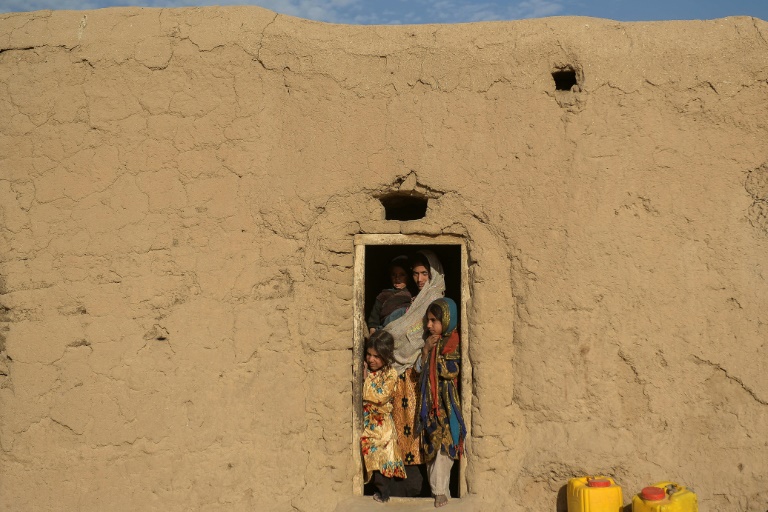Drought stalks the parched fields around the remote Afghan district of Bala Murghab, where climate change is proving a deadlier foe than the country’s recent conflicts.
As the world watched the Taliban wage a stunning offensive that ended in the rapid collapse of the country’s western-backed government, a longer-term crisis was building.
In desperate attempts to feed their families, herders have been forced to sell their livestock, farmers to flee their villages and parents to sell their daughters into marriage at ever younger ages.
“The last time I saw rain was last year, and there wasn’t much,” Mullah Fateh, head of the Haji Rashid Khan village in Bala Murghab.
Communities cling to life in small clusters of mud-brick homes among an endless ocean of rolling brown hills in this corner of Badghis province — where 90 percent of the 600,000-strong population live off livestock or fields, according to humanitarian agency ACTED.
“We sold sheep to buy food, others died of thirst,” Fateh told AFP.
When the first of two recent droughts hit in 2018, he had 300 sheep, but as the latest dry spell bites, he’s down to 20.
On Monday, UN agencies said more than 22 million Afghans will suffer “acute food insecurity” this winter, warning the unstable country faces one of the world’s worst humanitarian crises.
Aid-dependent Afghanistan, which has spent decades trapped in cycles of war, has borne the sixth hardest blow from climate change, driven by greenhouse emissions such as CO2, according to a study by environmental group Germanwatch.
An Afghan lifestyle causes 0.2 tonnes of CO2 emissions per year, compared to 15 from the average American, World Bank figures show.
As predicted, one of the devastating effects has been a drop in rainfall in northern Afghanistan.
– Rise in child marriage –
When Mullah Fateh needs to fetch water, he sends young boys and men on a day-long trip with a donkey. This year, he said, two young shepherds died of thirst in the hills.
The thirst attacks not just the body, but family bonds.
This year 20 families in Haji Rashid Khan village, which has no school and no clinic, sold their very young daughters into marriage, to raise money for food.
“The rest of the children were hungry and thirsty,” explained Bibi Yeleh, a mother of seven whose 15-year-old daughter is already married and whose seven-year-old will soon follow.
If the drought continues, she said, a two and a five-year-old will be next, to be handed over to the groom’s family when they are older.
Around 45 of roughly 165 families in the village and tens of thousands across the province have been displaced this year into miserable camps on the outskirts of larger towns.
Even there, food is hard to come by, and some take desperate risks.
“Families stay, but the men need to go to look for work in Iran or beyond, some die on the road,” says Musanmill Abdullah, 28, who lives with his family in another Badghis village.
The community is named after his father, Haji Jamal, and Abdullah is a member of the Taliban, the movement which should be celebrating its victory in the civil war.
But military and political success in Kabul has done little to help Badghis.
“The fields are ruined, the animals have nothing. Over the past two years, six people died of hunger,” the elder man, Haji Jamal, said.
“The jerry cans we use to gather water have worn through and we can’t afford to replace them.”
Neighbour Lal Bibi said as desperation grows, the “women and children are alone, and in danger”.
– Aid flow disrupted –
Few of the local people have heard of climate change, but the UN report warned that annual droughts in several Afghan regions will “probably become the norm” by 2030.
The Taliban has not yet been recognised by foreign governments and has been frozen out of Afghanistan’s financial reserves, held mainly in the US, with the flow of aid also disrupted.
Regional representatives of the new Taliban government said there is little they can do.
“The Emirate hasn’t got a lot of money. Our plans are linked to the international community,” admitted Abdul Hakim Haghyar of the Badghis province refugees office.
Some international NGOs are still operating and foreign governments have promised humanitarian aid if it can be routed to the people — but the Taliban remain under sanctions.
In the camps for displaced farmers, matters have become desperate. When nine-year-old Bashir Ahmad’s father sold his last livestock, the young boy got a job scavenging for discarded cans and bottles.
Among the rubbish, he found an unexploded munition. It detonated and he lost two fingers on one hand, three on another. Now he lies by his dad, his hands in bandages, a new burden to bear.









